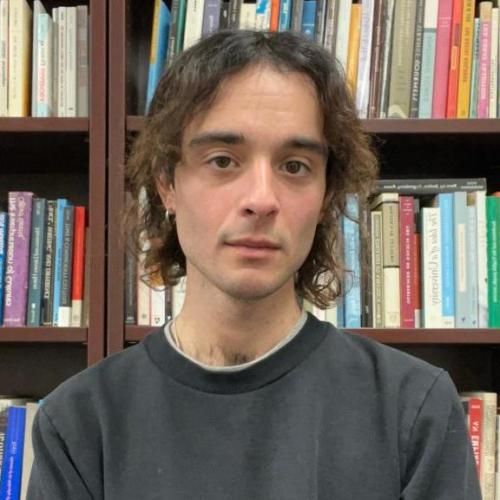Overview
Britton Edelen is a doctoral candidate in English literature, working primarily on European Modernism in English, French, and German. With a comparatist background and an interest in 20th-century continental philosophy, his research, broadly conceived, concerns the play, limits, and failures of language and the ethical potentials of aesthetic works.
Britt's dissertation project, "Language Worked Over: Energy, Exhaustion, and Modernism," explores poetic responses to what he calls the "pneumatic crisis" of modernity—the discovery of thermodynamic principles and their subsequent application to and governance of human life. In this project, Britt reads various writers—Mallarmé, Rimbaud, Woolf, Beckett, and Celan—as concerned with both a metaphorical and literal energetics of language and literature; in them, he identifies a counter-modern "poetics of exhaustion," in which exhaustion is figured not as the bane of individual and social life, but as an artistic telos that has the potential to challenge dominant capitalist discourses and practices that seek to ameliorate and eradicate the experience of exhaustion.Drawing on psychoanalysis, deconstruction, and Marxism, Britt's dissertation seeks not to discern how language works, but how it works on us, exhausts us, and the ethico-political implications that come with the fatigue of the speaking subject.
Britt holds a BA in English Literature from Brown University, where he graduated with honors after completing a thesis on philosophical and aesthetic figurations of talking animals. Currently, he co-convenes the Psychoanalysis Now! Reading Group, sponsored by the John Hope Franklin Humanities Institute.
Britt's dissertation project, "Language Worked Over: Energy, Exhaustion, and Modernism," explores poetic responses to what he calls the "pneumatic crisis" of modernity—the discovery of thermodynamic principles and their subsequent application to and governance of human life. In this project, Britt reads various writers—Mallarmé, Rimbaud, Woolf, Beckett, and Celan—as concerned with both a metaphorical and literal energetics of language and literature; in them, he identifies a counter-modern "poetics of exhaustion," in which exhaustion is figured not as the bane of individual and social life, but as an artistic telos that has the potential to challenge dominant capitalist discourses and practices that seek to ameliorate and eradicate the experience of exhaustion.Drawing on psychoanalysis, deconstruction, and Marxism, Britt's dissertation seeks not to discern how language works, but how it works on us, exhausts us, and the ethico-political implications that come with the fatigue of the speaking subject.
Britt holds a BA in English Literature from Brown University, where he graduated with honors after completing a thesis on philosophical and aesthetic figurations of talking animals. Currently, he co-convenes the Psychoanalysis Now! Reading Group, sponsored by the John Hope Franklin Humanities Institute.

